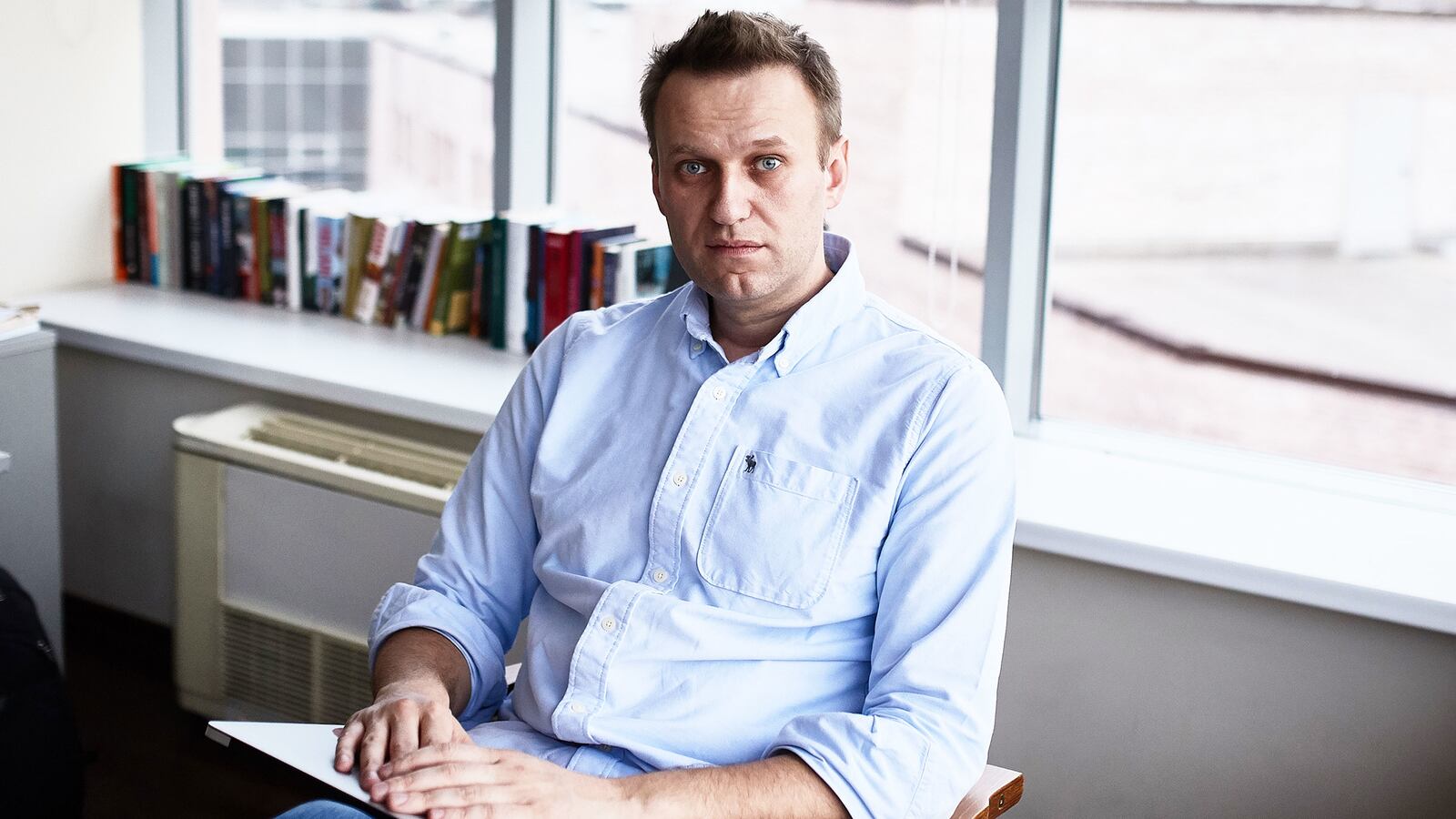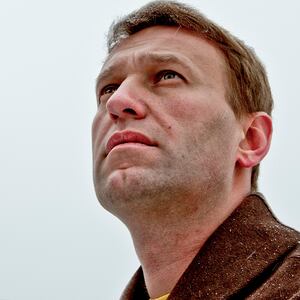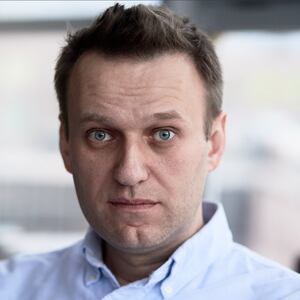MOSCOW—At about 8 o’clock Thursday night, days before municipal elections, police special forces—men in black uniforms with faces hidden under black balaclavas—broke the door to opposition leader Alexei Navalny’s Anti-Corruption Foundation, stormed in and confiscated pretty much everything: computers, cameras, film lights, cell phones, clothes, food, as well as thousands of documents important for independent election observers. Two hours later police detained nine of the foundation’s members in different corners of the Russian capital.
During the raid Navalny, famous for his cool resistance and extraordinary stamina, took a video of his team’s lawyers playing soccer in the office, as if nothing unusual was happening. In the past decade Russian authorities have put Navalny behind bars dozens of times for hundreds of days.
Navalny has risked his life in a political environment where many opponents and critics of President Vladimir Putin have been killed or died under suspicious circumstances. Last month somebody tried to shut him up in jail with a mysterious poison. Although Navalny and several other key opposition politicians spent weeks of their summer behind bars, thousands of protesters came out to the streets—showing the movement could live without leaders. Random Moscow residents demanded fair and free elections and an end to political repression. People marched on Moscow’s streets chanting: “Russia will be free!”
In an interview with The Daily Beast earlier this year Navalny said, “We are fearless and unstoppable, no matter how harsh the pressure is from Putin’s thuggish government.”
If Navalny is calm and stable, Russian authorities have demonstrated hysterical behavior during the weeks of the election campaign: nearly every weekend police grabbed thousands of peaceful protesters at anti-government rallies, threatening children and parents, releasing some political prisoners and locking up others for long terms.
“This is the most chaotic and messy strategy; obviously Russian authorities miscalculated the opposition’s explosive potential force,” Tanya Lokshina, associate director for Human Rights Watch’s Europe and Central Asia division, told The Daily Beast. “Nearly every weekend police units block Moscow streets for pedestrians and injure dozens of peaceful people, who exercise their constitutional right; at least five opposition activists have been sentenced to shockingly long terms--two, three, four years in prison.”
An estimated 30 percent of Moscow’s protesters are young people, age 20 to 35, many of them are students at Russia’s best universities, and the opposition student movement is growing, participants sign letters demanding to free political prisoners, collect money for defense lawyers, organize peaceful rallies and discussions.
“We are a positive movement, our main strength is solidarity, we are sincere, we unite against indifference, cynicism and the unfairness of government actions,” 21-year-old student Nikita Ponarin told The Daily Beast on Friday.
Ponarin is in his fourth year at the Higher School of Economics, one of Russia’s leading state universities. He studies political science and as with many well-educated young Russians is critical of the Kremlin’s politics.
Day after day before the elections municipal services wash Moscow’s central streets with soap, paint façades of the buildings, fix roofs and install fancy street lighting while police grab the future Russian professional, the new generation of liberal politicians all over these streets.
“We have no lack of access to information about the wars in Ukraine or Syria, we are not afraid of fines or dozens of days in jail as punishment for our participation in protests; but we are concerned about long prison terms,” Ponarin admitted to The Daily Beast.
While police raided Navalny’s office on Thursday night, a Moscow court sentenced one more opposition activist, 34-year-old IT specialist Konstantin Kotov to four years in prison for participating in several unsanctioned protests this year. Hundreds of people chanted Freedom for Kotov! Freedom for political prisoners! Russia will be free!” outside of the court at a spontaneous protest.
“The Russian Constitutional Court ruled that peaceful protesters should not be put in jail even for a minute, if they do not constitute a threat to society and yet they sentenced Kotov to a shockingly long term, four years in prison,” Lokshina told The Daily Beast after examining the court’s verdict.
Earlier this week police detained our colleague Ilya Azar, a journalist for the independent Novaya Gazeta, right outside of the unlocked door to his apartment. Just like Kotov, Azar was accused of attending unsanctioned protests. The journalist explained to police that his 2-year-old daughter was alone in the apartment but the state officials did not want to hear anything about any private issues and took Azar away from his baby. When Azar’s wife arrived half an hour later, the door to the flat was unlocked. Luckily, the baby girl was sleeping peacefully.
By arresting peaceful activists, Russian authorities risk turning politically passive citizens into opponents who will be joining rallies to demand their constitutional right.
University students refer to this strategy as “shortsighted,” and Russian lawmakers appear oblivious to their domestic mistakes. Instead, a special commission has been created to look for foreign enemies to blame for the protests.
A member of the State Duma, or parliament, Vadim Dengin, said he still suspected the West, especially the United States and Germany, of helping to develop the growing anti-Putin movement.
“Somebody helped the opposition to create professionally made banners like ‘Moscow, come out!’ Just imagine something like ‘Washington, come out!’" Dengin said. “Russian domestic politics is only Russia’s affairs. Nobody has a right to call for the change of power, a revolution. Soon we’ll publish the documents to show who was behind the revolt.”
(Americans concerned about the well-documented Russian interference in U.S. politics will no doubt see the irony in these claims.)
By now every small and big bureaucrat working at the Kremlin’s administration and Moscow city hall must realize that no arrests, no threats can put an end to the anti-Putin rallies and to the newly emerging political class.
For 15 days before the Moscow elections, Navalny’s Anti-Corruption Foundation had been publishing reports about shadowy schemes plotted by President Vladimir Putin’s federal and municipal government members.
The latest investigative reports came out on Friday, just a few hours after police confiscations and detentions at Navalny’s office.
In one simple illustration Navalny showed photographs of Alexander Beglov, the acting governor of St.Petersburg, wearing watches worth more than an average Russian’s annual salary, 10 million Rubles ($15,127). Navalny wondered where Beglov found money to buy the unaffordable-for-any-bureaucrat timepieces. Or, hm, did Beglov take the watches as bribes?
Navalny’s team also explained the anatomy of corruption at Moscow’s mayoral office, including dubious real estate schemes for more than $100 million. The corruption fighters showed Moscow Deputy Mayor Natalya Sergunina’ five huge residences, giving details of offshore real estate deals registered on Sergunina’s sister, husband Lazar Safaniyev and Safaniyev’s British and Austrian companies.
“Honest, competent people should be managing Moscow but they will never appear if we are going to sit on the couch,” the report concluded. “We have neither a right to voluntarily give up on Moscow city hall, nor on St. Petersburg municipality or any other institution with power.”








